Java 每次把一个Swing组件放在一个JPanel中时,总是放在左边,有啥办法让其放在面板中间?
Posted
tags:
篇首语:本文由小常识网(cha138.com)小编为大家整理,主要介绍了Java 每次把一个Swing组件放在一个JPanel中时,总是放在左边,有啥办法让其放在面板中间?相关的知识,希望对你有一定的参考价值。
由于底色是白色,于是下面这道线是这个图片的长度,看了你就知道我在说什么了。
-----------------------------------------------------------------------------------------(图片长度)
就是...这个样子?
好吧,我搞错了,应该是这个样子的....
Container布局是两行一列的网格,在第一个网格中放入一个JLabel...

JLabel label=new JLabel("abcde",SwingConstants.CENTER);
上例为居中对齐。 参考技术A 我觉得可以流式布局 然后可以加空的移到中间。。追问
我说错了,这是一个两行一列的网格,JLabel在一个网格中置左,有什么办法置中?
参考技术B 可以使用布局、也可以不要布局自己定位追问我说错了,这是一个两行一列的网格,JLabel在一个网格中置左,有什么办法置中?
追答先放JPanel、再放JLabel,,,,,
201771010110孔维滢《面向对象程序设计(java)》第十二周学习总结
理论知识部分
1.Java的抽象窗口工具箱(AbstractWindow Toolkit,AWT)包含在java.awt包中,它提供了许 多用来设计GUI的组件类和容器类。
2.Swing用户界面库是非基于对等体的GUI工具箱。Swing类库被放在javax.swing包里。
3.大部分AWT组件都有其Swing的等价组件。
Swing组件的名字一般是在AWT组件名前面添加一个字母“J”,如:JButton,JFrame,JPanel等。
4.组件:通常把由Component类的子类或间接子类创建的对象称为一个组件。
5.容器是Java中能容纳和排列组件的组件。
常用的容器是框架(Frame,JFrame)
例: Frame fra= new Frame(“这是一个窗口”);
Container类提供了一个方法add(),用来在容器类组件对象中添加其他组件。容器本身也是一个组件,可以把一个容器添加到 另一个容器里,实现容器嵌套。
6.框架:在Java中,常采用框架(Frame)创建初始界面, 即GUI的顶层窗口
AWT库中有一个基于对等体的Frame类。
框架定位与框架属性:
定位: 常用Component类的setLocation和setBounds方法 常用属性
Title:框架标题
IconImage:框架图标
确定框架大小:通过调用Toolkit类的方法来得到屏幕尺寸信息。
7.在AWT中可调用add()方法把组件直接添加到AWT Frame中,在Swing中组件则添加到内容窗格里。
8.Graphics2D类是Graphics类的子类,Graphics 2D类对象通常可用Graphics对象转换而来。
例: public void paintComponent(Graphics g) { graphics2D g2=(graphics 2D)g; ….. }
9.Java 2D图形类使用浮点数坐标系,这样可为坐标指定单位。
getWidth()返回double值,应进行转换: float f=(float)r.getWidth();
10.2D库为每个图形类提供两个版本的静态内部类: Retangle2D.Float 和 Retangle2D.Double
11.Graphics2D类的setPaint方法(Graphics类为 setColor方法)用来设置颜色。
例:g2.setPaint(Color.RED);
g2.drawString(“Set Color”,100,100);
通过指定红绿蓝三色比例,用Color类对象来复合成 一种新的颜色。
Color构造器如: Color(intredness,intgreenness,intblueness)
12.字体的使用:
(1)AWT中定义的五种逻辑字体名:
SanaSerif ?
Serif ?
Monospaced ?
Dialog ?
DialogInput
(2)字体风格:
Font.PLAIN ?
Font.BOLD ?
Fond.ITALIC ?
Fond.BOLD+ Font.ITALIC
(3)设置字体:
Font serif=new Font(“Serif”,Font.BOLD,14);
g2.setFont(serif);
13.图像:
(1)在Java应用程序中,一旦图像保存在本地或因 特网的某个位置上,就可以将它们直接读入到java 应用程序中。
String filename = “…”;
Image image= ImageIcon(filename).getImage();
(2)完成将一个图像文件加载到程序中,再调用 Graphics类提供的DrawImage()显示它。
public void paintComponent(Graphics g) { … g.drawImage(image, x, y, null); }
实验部分:
测试程序1:
import javax.swing.*;
public class SimpleFrameTest1
{
public static void main(String[] args)
{
JFrame frame = new JFrame(); //构造JFrame类对象
frame.setBounds(0, 0, 300, 200);//移动组件并调整其大小。
frame.setDefaultCloseOperation(JFrame.EXIT_ON_CLOSE);//设置默认关闭操作,退出并关闭
frame.setVisible(true);//设置Visible属性,组件可见
}
}
输出结果:
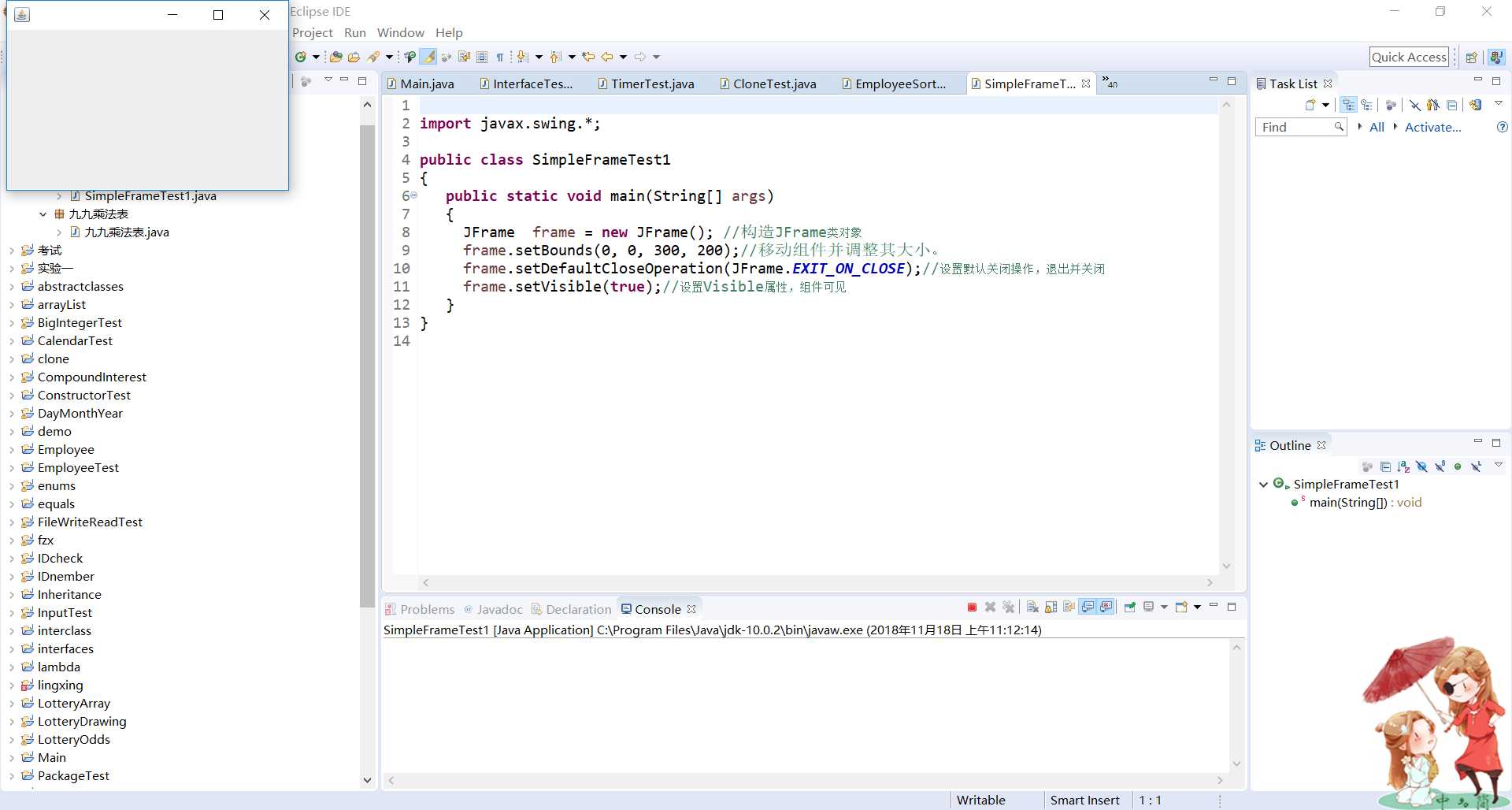
import java.awt.*;
import javax.swing.*;
/**
* @version 1.33 2015-05-12
* @author Cay Horstmann
*/
public class SimpleFrameTest
{
public static void main(String[] args)
{
EventQueue.invokeLater(() ->//Lambda表达式
{
SimpleFrame frame = new SimpleFrame();//构造SimpleFrame类对象
frame.setDefaultCloseOperation(JFrame.EXIT_ON_CLOSE);//设置默认关闭操作,退出并关闭
frame.setVisible(true);//设置Visible属性,组件可见
});
}
}
class SimpleFrame extends JFrame
{
private static final int DEFAULT_WIDTH = 300;//设置静态属性
private static final int DEFAULT_HEIGHT = 200;
public SimpleFrame()//构造器
{
setSize(DEFAULT_WIDTH, DEFAULT_HEIGHT);//使用给定的宽度和高度,设置组建的大小
}
}
输出结果:
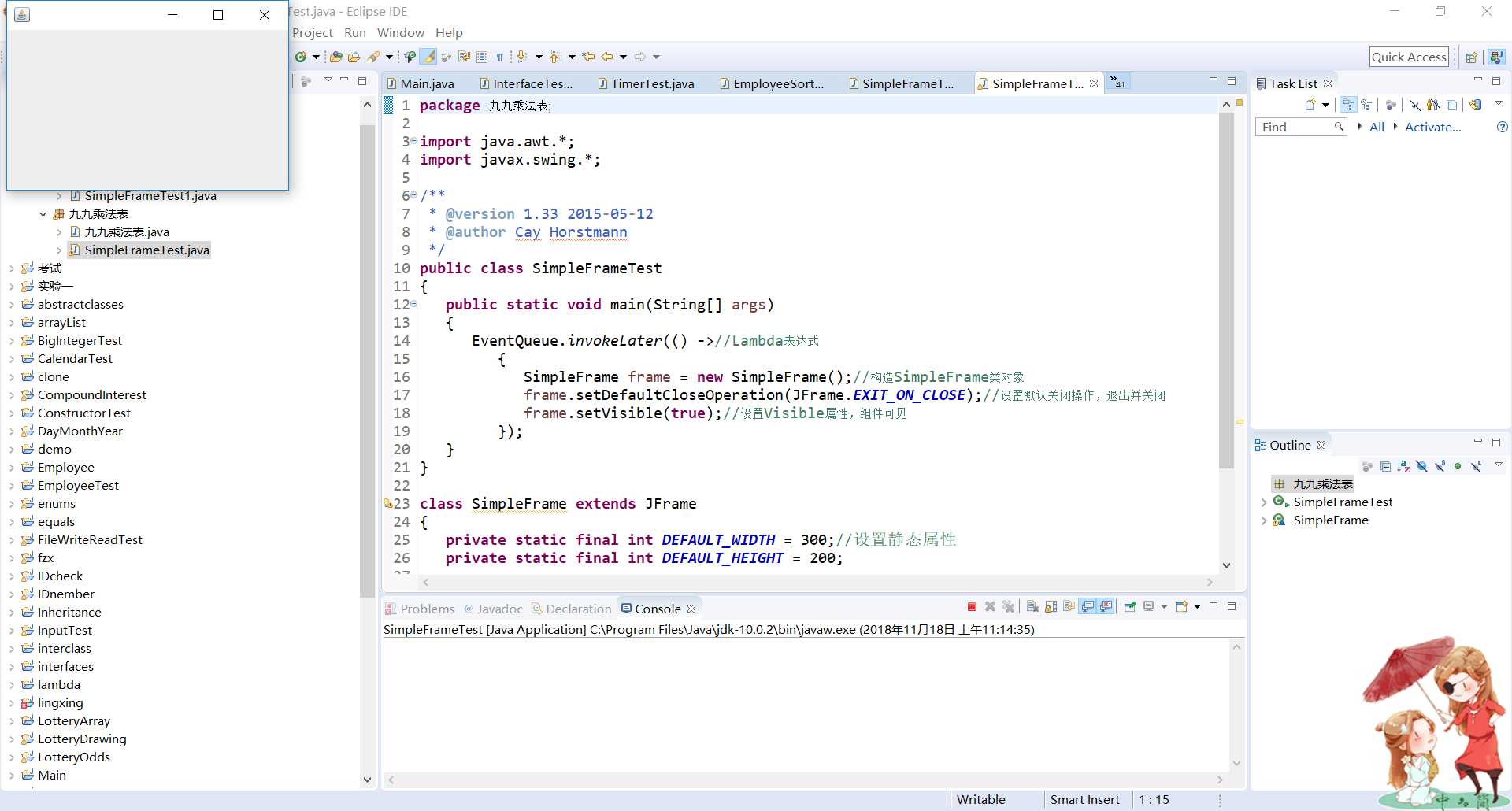
测试程序2:
import java.awt.*;
import javax.swing.*;
/**
* @version 1.34 2015-06-16
* @author Cay Horstmann
*/
public class SizedFrameTest
{
public static void main(String[] args)
{
EventQueue.invokeLater(() ->
{
JFrame frame = new SizedFrame();//构建一个SizedFrame类对象
frame.setTitle("SizedFrame");//设置Title属性,确定框架标题栏中的文字
frame.setDefaultCloseOperation(JFrame.EXIT_ON_CLOSE);//设置默认关闭操作,退出并关闭
frame.setVisible(true);//设置Visible属性,组件可见
});
}
}
class SizedFrame extends JFrame
{
public SizedFrame()
{
// 获取屏幕尺寸
Toolkit kit = Toolkit.getDefaultToolkit();//静态方法,生成Toolkit对象
Dimension screenSize = kit.getScreenSize();//返回Dimension对象的屏幕大小
int screenHeight = screenSize.height;//通过对象访问一个属性值,获得Dimension对象的屏幕宽度和高度
int screenWidth = screenSize.width;
// 设置框架宽度,高度,并让平台拾取屏幕位置
setSize(screenWidth / 2, screenHeight / 2);
setLocationByPlatform(true);
// 设置框架图标
Image img = new ImageIcon("icon.gif").getImage();
setIconImage(img);
}
}
输出结果:
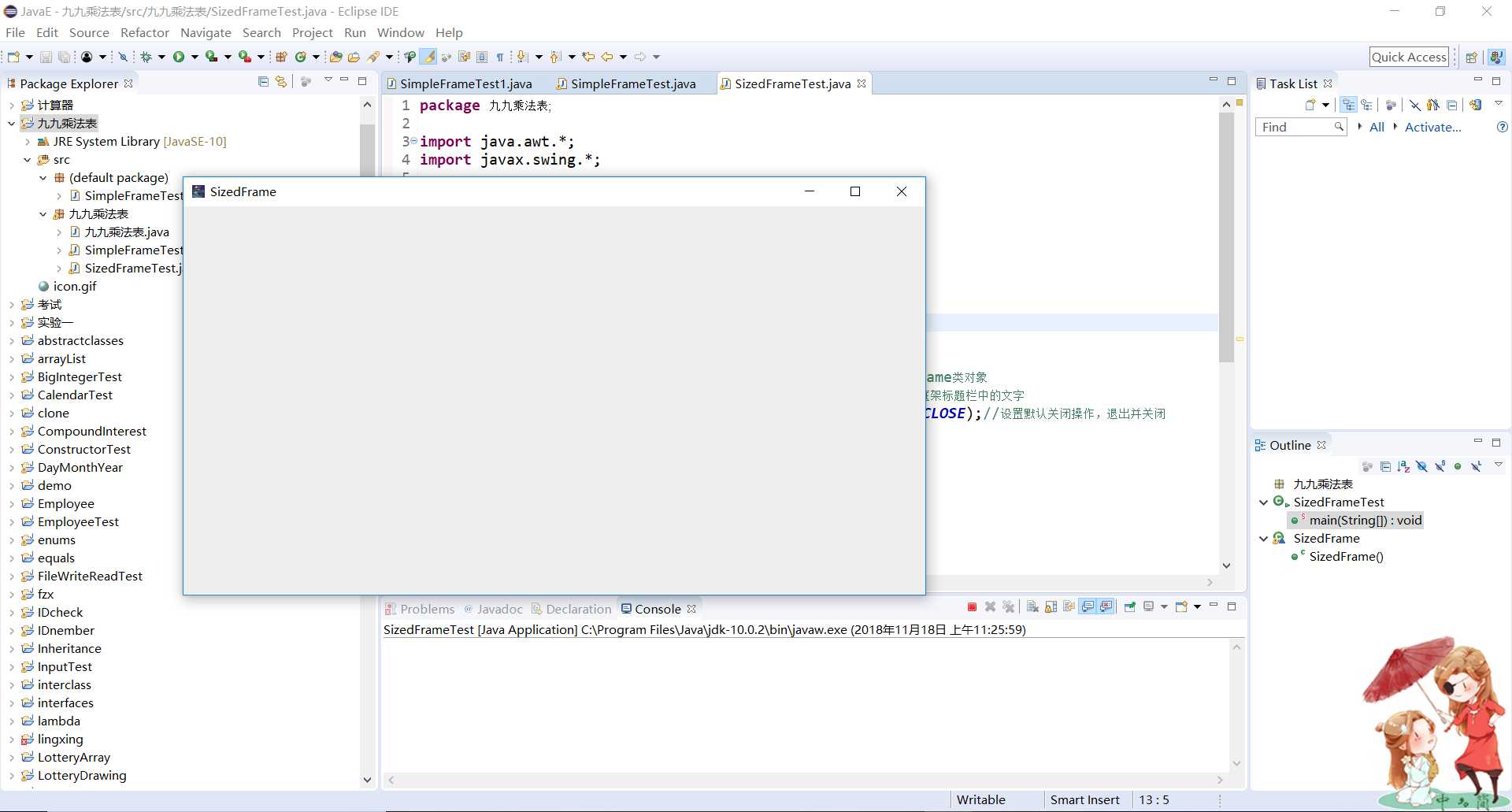
测试程序3:
package notHelloWorld;
import javax.swing.*;
import java.awt.*;
/**
* @version 1.33 2015-05-12
* @author Cay Horstmann
*/
public class NotHelloWorld
{
public static void main(String[] args)
{
EventQueue.invokeLater(() ->
{
JFrame frame = new NotHelloWorldFrame();//构建一个SizedFrame类对象
frame.setTitle("NotHelloWorld");//设置Title属性,确定框架标题栏中的文字
frame.setDefaultCloseOperation(JFrame.EXIT_ON_CLOSE);//设置默认关闭操作,退出并关闭
frame.setVisible(true);//设置Visible属性,组件可见
});
}
}
/**
* A frame that contains a message panel
*/
class NotHelloWorldFrame extends JFrame
{
public NotHelloWorldFrame()
{
add(new NotHelloWorldComponent());
pack();//调整窗口大小,要考虑到其组件的首选大小
}
}
/**
* A component that displays a message.
*/
class NotHelloWorldComponent extends JComponent
{
public static final int MESSAGE_X = 75;
public static final int MESSAGE_Y = 100;
private static final int DEFAULT_WIDTH = 300;
private static final int DEFAULT_HEIGHT = 200;
public void paintComponent(Graphics g)//覆盖这个方法来描述应该如何绘制自己的组件
{
g.drawString("Not a Hello, World program", MESSAGE_X, MESSAGE_Y);
}
public Dimension getPreferredSize() //要覆盖这个方法,返回这个组建的首选大小
{ return new Dimension(DEFAULT_WIDTH, DEFAULT_HEIGHT); }
}
输出结果:
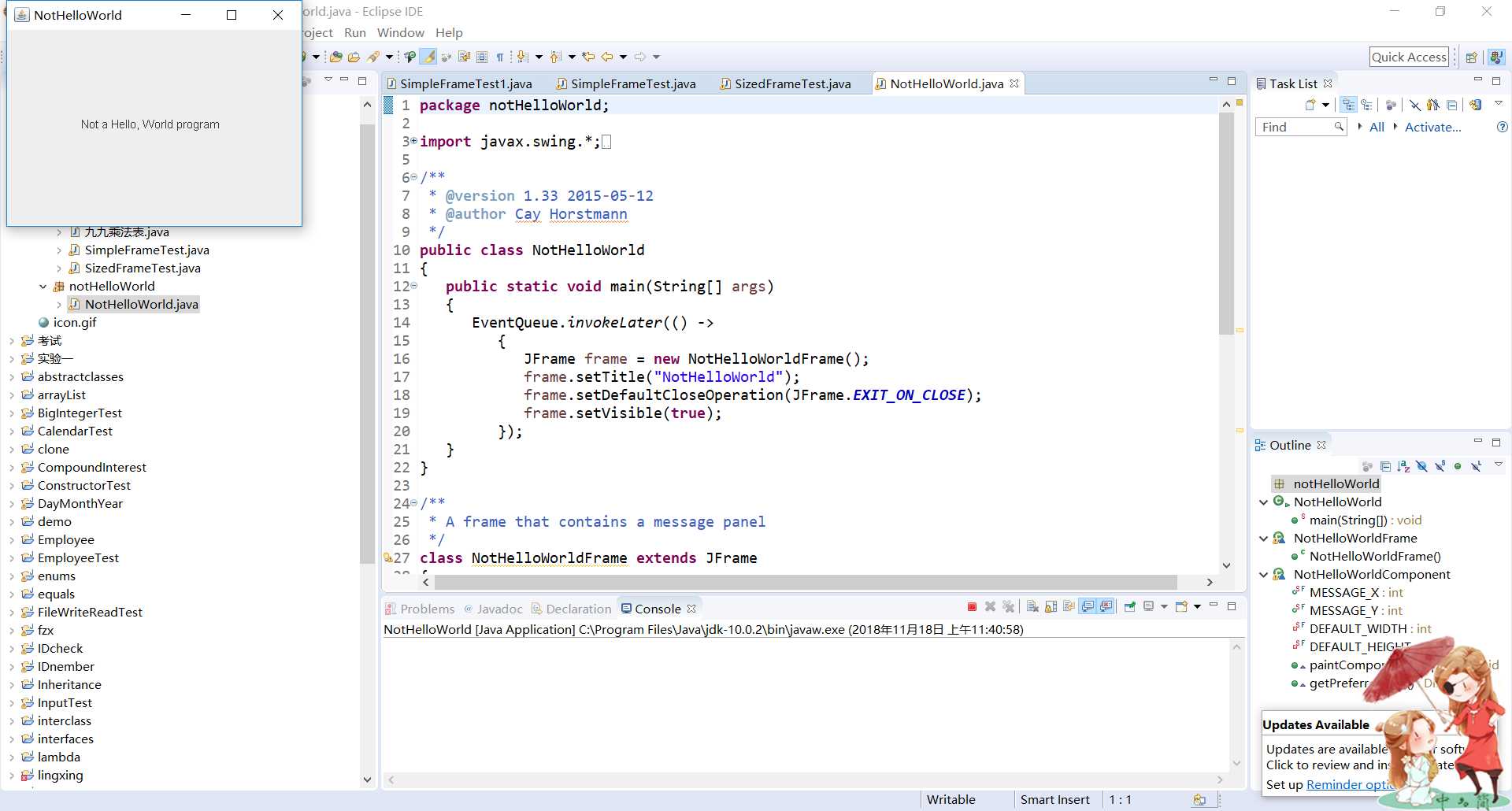
测试程序4:
package draw;
import java.awt.*;
import java.awt.geom.*;
import javax.swing.*;
/**
* @version 1.33 2007-05-12
* @author Cay Horstmann
*/
public class DrawTest
{
public static void main(String[] args)
{
EventQueue.invokeLater(() ->
{
JFrame frame = new DrawFrame();
frame.setTitle("DrawTest");
frame.setDefaultCloseOperation(JFrame.EXIT_ON_CLOSE);
frame.setVisible(true);
});
}
}
/**
* A frame that contains a panel with drawings
*/
class DrawFrame extends JFrame
{
public DrawFrame()
{
add(new DrawComponent());
pack();
}
}
/**
* A component that displays rectangles and ellipses.
*/
class DrawComponent extends JComponent
{
private static final int DEFAULT_WIDTH = 400;
private static final int DEFAULT_HEIGHT = 400;
public void paintComponent(Graphics g)
{
Graphics2D g2 = (Graphics2D) g;
// 画一个矩形
double leftX = 100;
double topY = 100;
double width = 200;
double height = 150;
Rectangle2D rect = new Rectangle2D.Double(leftX, topY, width, height);
g2.draw(rect);
// 画出封闭的椭圆
Ellipse2D ellipse = new Ellipse2D.Double();
ellipse.setFrame(rect);
g2.draw(ellipse);
// 画一条对角线
g2.draw(new Line2D.Double(leftX, topY, leftX + width, topY + height));
// 画一个圆心相同的圆
double centerX = rect.getCenterX();
double centerY = rect.getCenterY();
double radius = 150;
Ellipse2D circle = new Ellipse2D.Double();
circle.setFrameFromCenter(centerX, centerY, centerX + radius, centerY + radius);
g2.draw(circle);
}
public Dimension getPreferredSize() { return new Dimension(DEFAULT_WIDTH, DEFAULT_HEIGHT); }
}
输出结果:
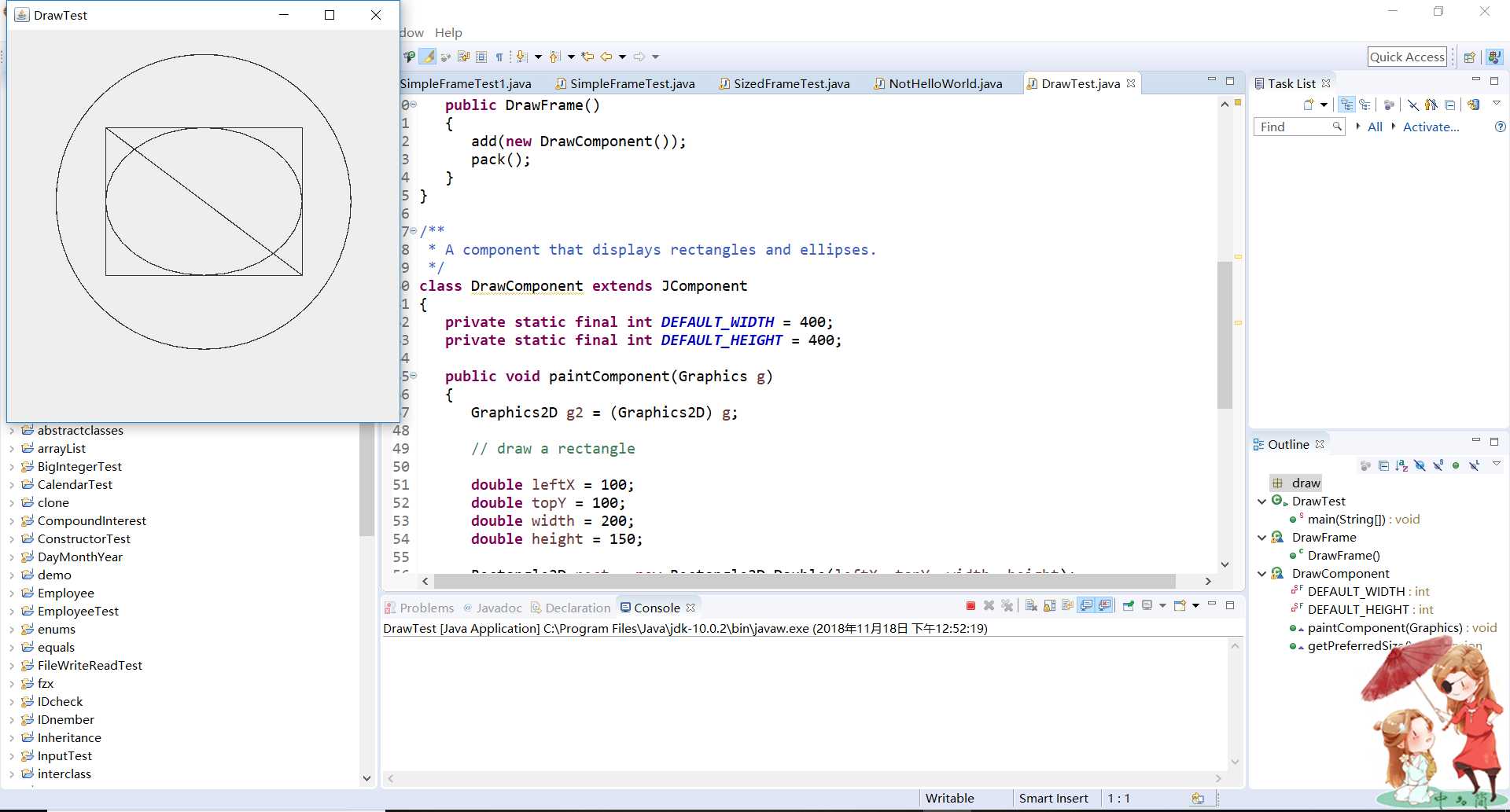
测试程序5:
package font;
import java.awt.*;
import java.awt.font.*;
import java.awt.geom.*;
import javax.swing.*;
/**
* @version 1.34 2015-05-12
* @author Cay Horstmann
*/
public class FontTest
{
public static void main(String[] args)
{
EventQueue.invokeLater(() ->
{
JFrame frame = new FontFrame();
frame.setTitle("FontTest");
frame.setDefaultCloseOperation(JFrame.EXIT_ON_CLOSE);
frame.setVisible(true);
});
}
}
/**
* A frame with a text message component
*/
class FontFrame extends JFrame
{
public FontFrame()
{
add(new FontComponent());
pack();
}
}
/**
* A component that shows a centered message in a box.
*/
class FontComponent extends JComponent
{
private static final int DEFAULT_WIDTH = 300;
private static final int DEFAULT_HEIGHT = 200;
public void paintComponent(Graphics g)
{
Graphics2D g2 = (Graphics2D) g;
String message = "Hello, World!";
Font f = new Font("Serif", Font.BOLD, 36);
g2.setFont(f);
// 用同样的中心画一个圆,测量信息的大小
FontRenderContext context = g2.getFontRenderContext();
Rectangle2D bounds = f.getStringBounds(message, context);
// 设置(x,y) =文本左上角
double x = (getWidth() - bounds.getWidth()) / 2;
double y = (getHeight() - bounds.getHeight()) / 2;
// 增加上升到y以达到基线
double ascent = -bounds.getY();
double baseY = y + ascent;
// 画出message
g2.drawString(message, (int) x, (int) baseY);
g2.setPaint(Color.LIGHT_GRAY);
// 画出基线
g2.draw(new Line2D.Double(x, baseY, x + bounds.getWidth(), baseY));
// 绘制包围的矩形
Rectangle2D rect = new Rectangle2D.Double(x, y, bounds.getWidth(), bounds.getHeight());
g2.draw(rect);
}
public Dimension getPreferredSize() { return new Dimension(DEFAULT_WIDTH, DEFAULT_HEIGHT); }
}
输出结果:
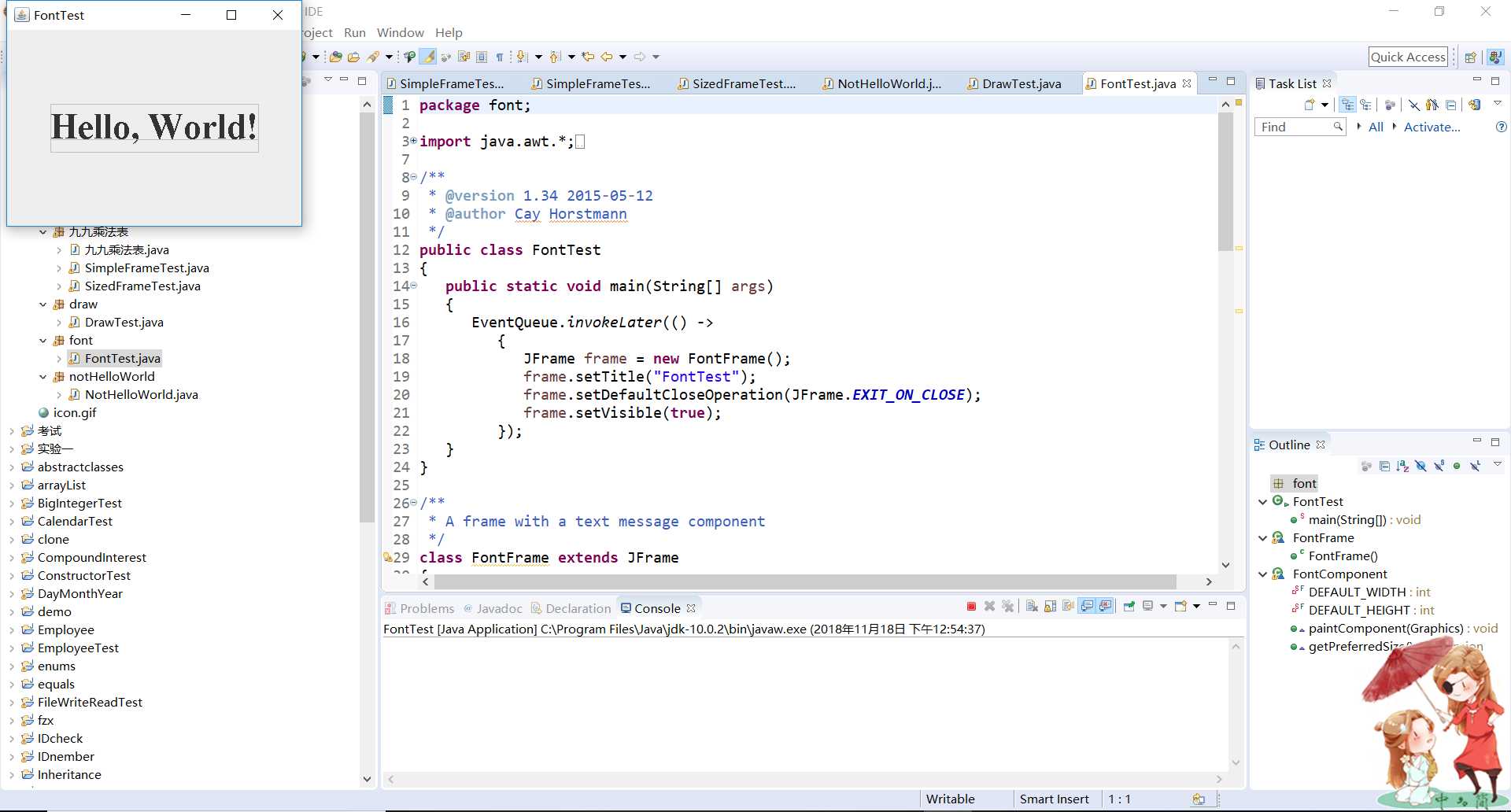
测试程序6:
package image;
import java.awt.*;
import javax.swing.*;
/**
* @version 1.34 2015-05-12
* @author Cay Horstmann
*/
public class ImageTest
{
public static void main(String[] args)
{
EventQueue.invokeLater(() ->
{
JFrame frame = new ImageFrame();
frame.setTitle("ImageTest");
frame.setDefaultCloseOperation(JFrame.EXIT_ON_CLOSE);
frame.setVisible(true);
});
}
}
/**
* A frame with an image component
*/
class ImageFrame extends JFrame
{
public ImageFrame()
{
add(new ImageComponent());
pack();
}
}
/**
* A component that displays a tiled image
*/
class ImageComponent extends JComponent
{
private static final int DEFAULT_WIDTH = 300;
private static final int DEFAULT_HEIGHT = 200;
private Image image;
public ImageComponent()
{
image = new ImageIcon("blue-ball.gif").getImage();
}
public void paintComponent(Graphics g)
{
if (image == null) return;
int imageWidth = image.getWidth(null);
int imageHeight = image.getHeight(null);
// 在左上角绘制图像
g.drawImage(image, 0, 0, null);
// 将图像平铺到组件上
for (int i = 0; i * imageWidth <= getWidth(); i++)
for (int j = 0; j * imageHeight <= getHeight(); j++)
if (i + j > 0)
g.copyArea(0, 0, imageWidth, imageHeight, i * imageWidth, j * imageHeight);
}
public Dimension getPreferredSize() { return new Dimension(DEFAULT_WIDTH, DEFAULT_HEIGHT); }
}
输出结果:
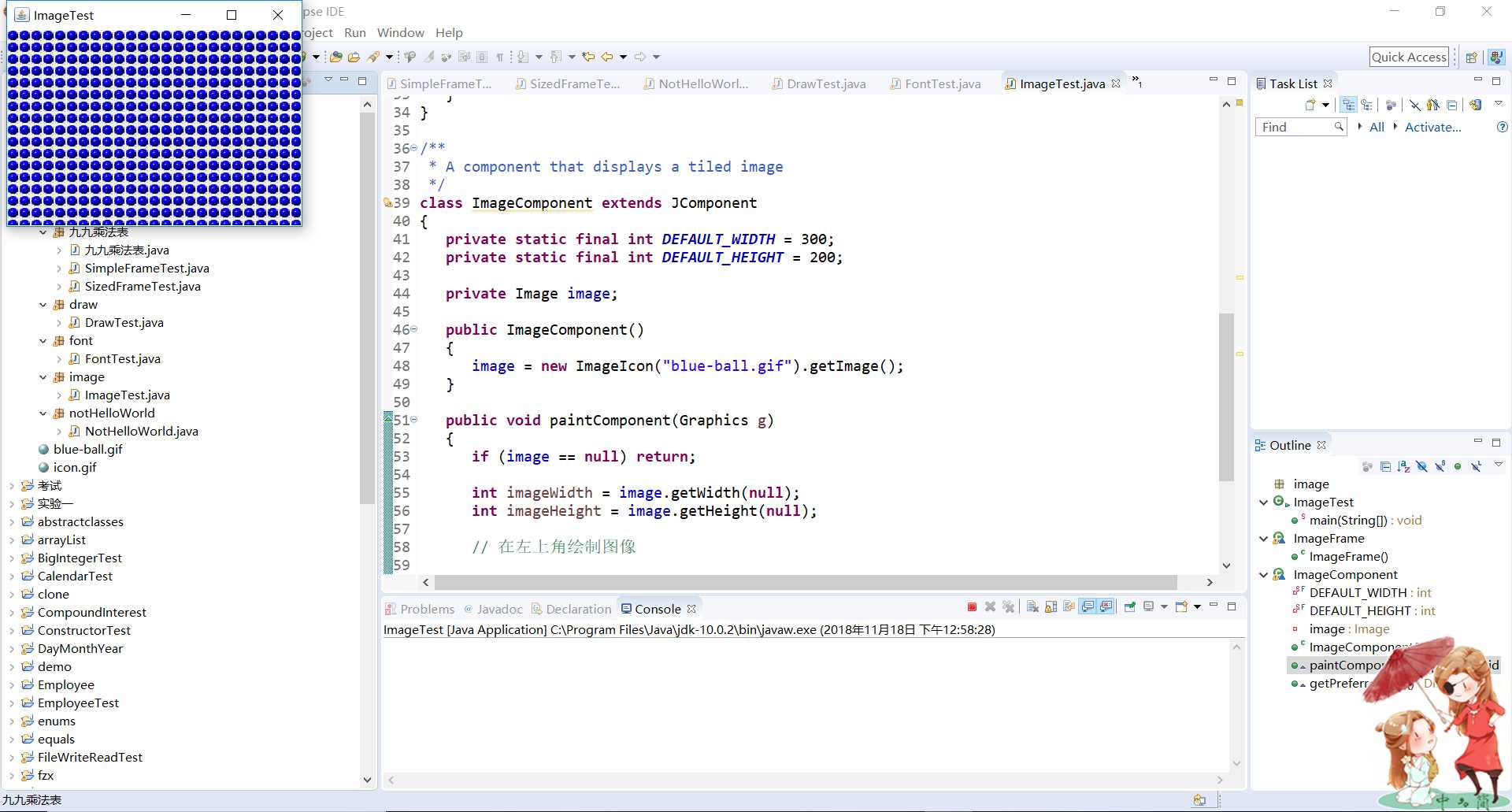
实验总结:
通过本周的学习,我掌握了AWT与Swing的概念,内容,还有Swing库中容器,组件和框架的的定义,学习了框架的使用方法。虽然看似简单,但是我在课本中学习到的只是一小部分,还需要更加系统的学习,让它更加美观,实用。
其次,通过练习,我觉得对于之前的学习,我还需加强,不能边学边忘,而是把这些知识都串联起来,运用起来。
以上是关于Java 每次把一个Swing组件放在一个JPanel中时,总是放在左边,有啥办法让其放在面板中间?的主要内容,如果未能解决你的问题,请参考以下文章